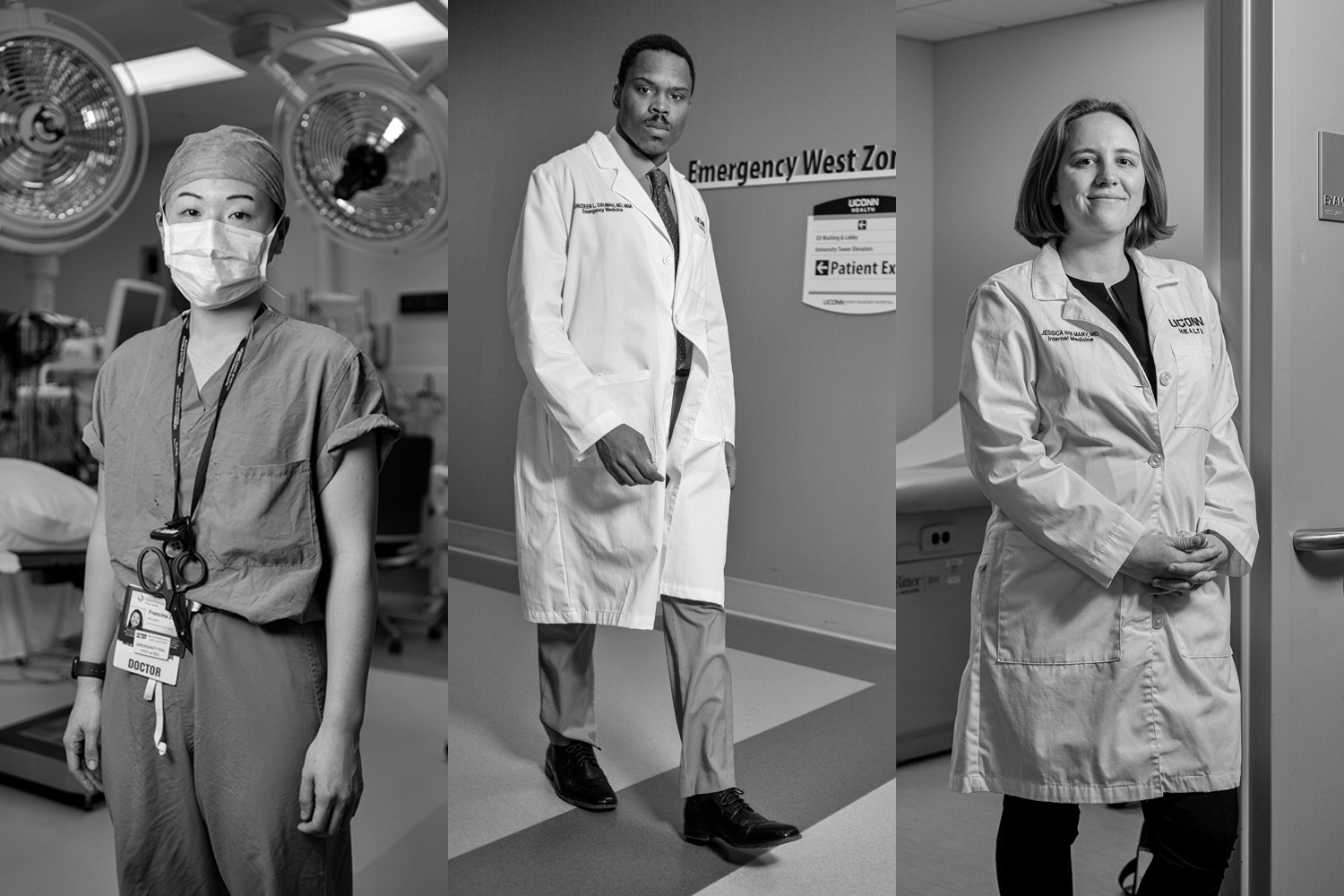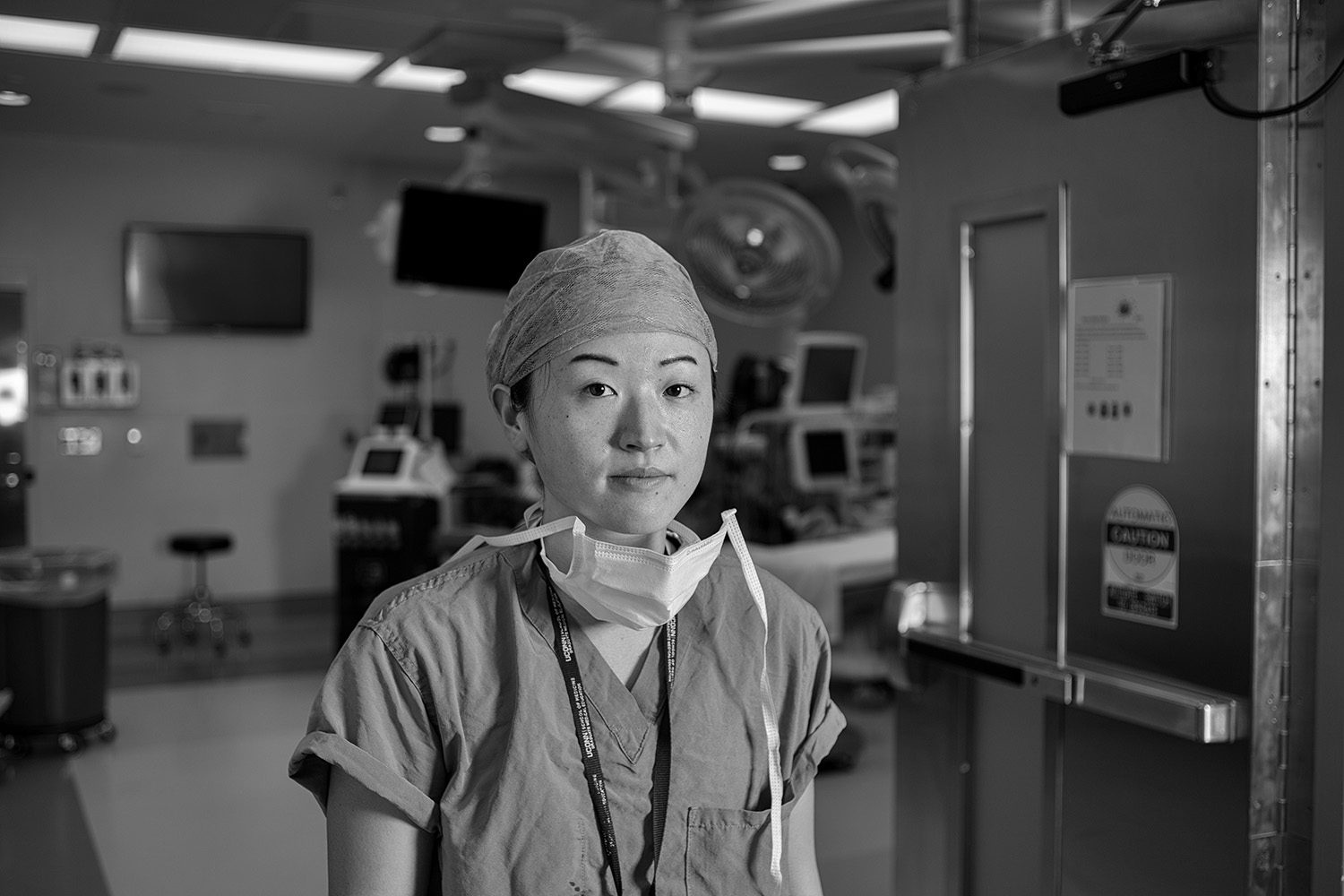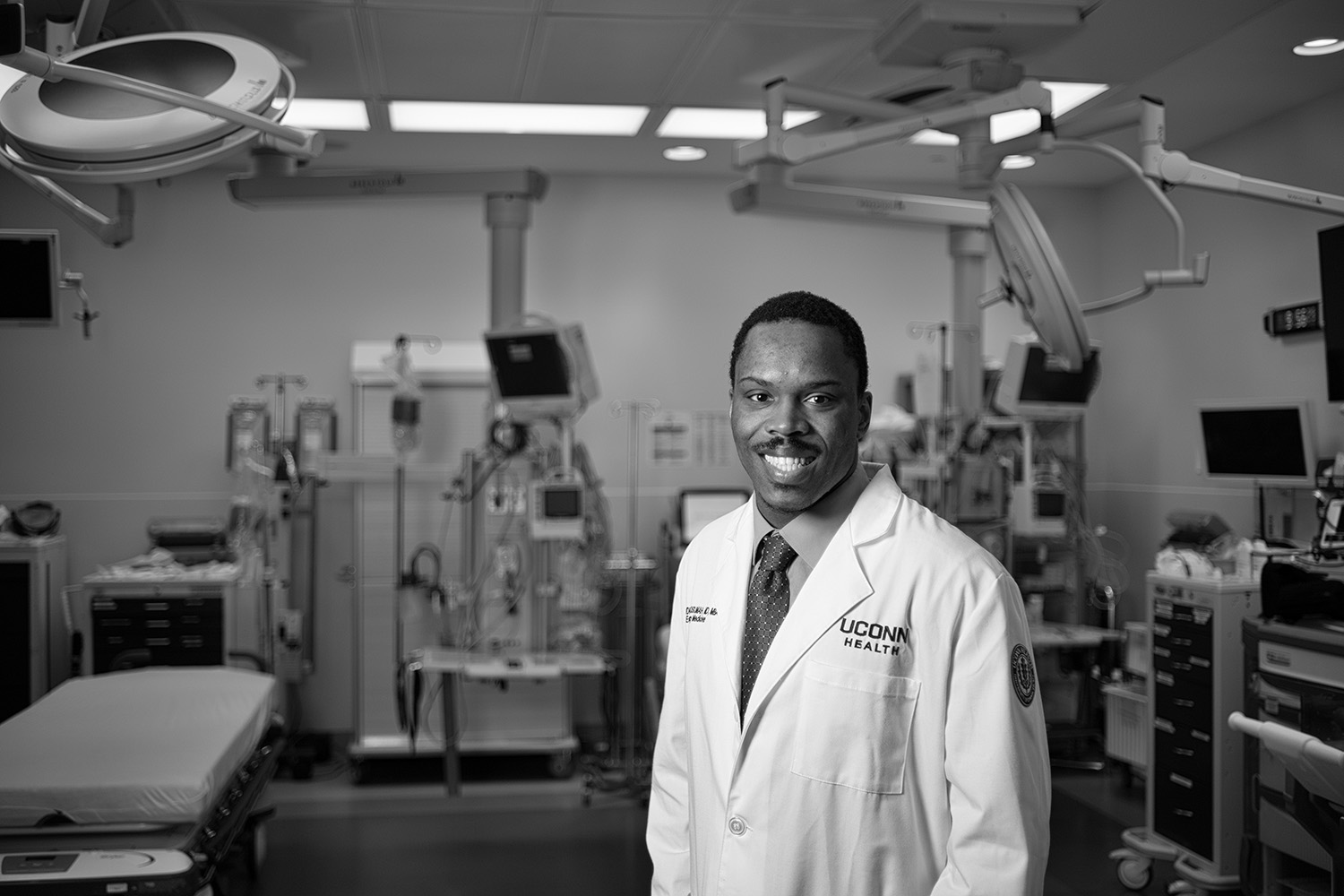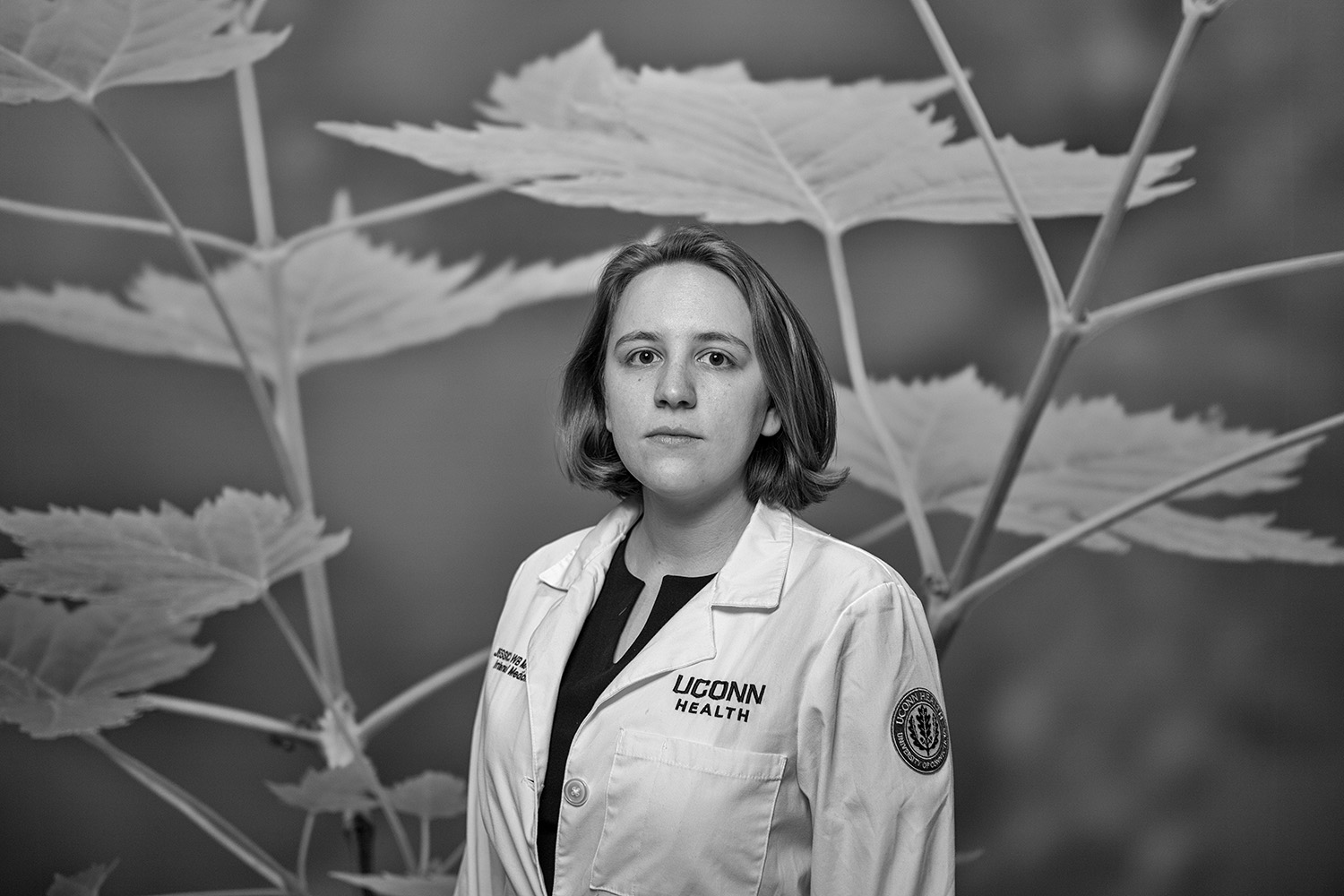
First-Years
Three UConn School of Medicine graduates take us through year one of residency — with its fast-and-furious rotations meant to teach the finer points of chosen specialties and the broad realities of what it means to be a practicing doctor.
By Jaclyn M. Severance
Photos by Peter Morenus
It's both an ending and a beginning: Match Day — when soon-to-be doctors find out where they will go for their residencies.
Moments before noon on March 18, 2022, three fourth-year medical students count down the seconds along with their classmates. They've known for four days that they've been paired with a program, but they are about to learn which. Is it their top choice? Where will they be living in just four months?
Dr. Francine Zeng '18 (CLAS), '22 MD watches the clock from her home in South Windsor, Connecticut, her sights set on an orthopedic surgery specialty at UConn Health. A dentist's daughter, Zeng always knew she wanted to enter a medical field — though, no offense to her father, she just doesn't love mouths. She discovered orthopedic surgery early in the program, when she had her first clinical and operative experience with an orthopedic surgeon who became a mentor. It was there that she fell in love with the OR.
"I love how operating works," Zeng says. "It is a very intimate, very intense procedure. But what I love about it is that you can actually just go in there and fix the problem that you've identified, and hopefully that's ultimately going to be what makes the patient feel better and helps them reach their goal of achieving their function back."
What is Match Day? During the fourth year of med school, students choose a specialty, apply to programs, interview, and rank their top choices. The programs rank their favorites, too, and an algorithm decides who goes where.
Fifty-some miles south, at home in West Haven, Dr. Nurudeen "Lucky" Osumah '21 MBA, '22 MD waits with his family by his side, hoping that he will be able to pursue emergency medicine at UConn Health. Osumah's path to the white coat has been untraditional — he took a year off from medical school to earn an MBA from UConn after attending a medical conference during his third year.
"They were talking about quality assurance metrics or something, and all I remember is how the back-and-forth between the doctors and the admins was going," he recalls. "They both wanted the best for the patient, but both had different ways to go about it, and it created conflict."
Osumah decided he wanted to learn how to bridge that gap between health care administrators and health care providers so that, somewhere down the line, he can sit at that crossroads and play the role of mediator, understanding where both sides are coming from and reaching a shared goal: better health care for the patients they all serve.
Dr. Jessica Mary '18 (CLAS), '22 MD, wants to stay at UConn, too, to practice internal medicine. She's anxiously waiting to learn whether she'll be signing the lease papers for a new apartment in New Britain later that afternoon — she's been pushing off the landlord until she knows for sure where she's matched.
The daughter of chemists, Mary grew up steeped in science but always knew she was more drawn to the human side than the lab bench.
"I know that I'm a much more cerebral person, and I wanted to do something that was more thought-based than procedure-based," she says. "What I really love about internal medicine is that you do get to think about the body as a whole. You get to think about how everything interplays."
As an undergraduate Mary enrolled in UConn's Special Program in Medicine, a four-year pre-med track, but it was a trip to the Dominican Republic with a pre-medical society — shadowing physicians in hospitals and contributing to medical care in a rural community on the island country — that cemented her desire to become a doctor.
"I had looked at different parts of health care, thought maybe nursing for a while," she says, "but after that, I was totally sold on it. Yes, this is definitely what I want to do, and I knew I wanted to do it at UConn."
At 12 p.m., each of the three students checks for the email that will reveal their fate.
The Surgeon: Dr. Francine Zeng

Every day I feel every spectrum of emotion. Feeling happy, grateful, and then it can immediately go to feeling embarrassed or a little dejected.— Dr. Zeng
First Date
In one of her early rotations as a UConn Health resident, Zeng finds herself running the surgery floor of a partner hospital alone when a full trauma comes in. Someone has been stabbed in the neck, and the more senior surgeons on that shift are already busy in operating rooms.
"I was definitely scared, because you see that and you just don't know how unstable or stable the patient can be," she says later. "Knowing that a lot of people were going to be watching me, or listening to what I had to say and what my suggestion was, that was intimidating. But I feel like, in the process of it, it just kind of clicked. Like, 'Oh, I was trained for this.'"
94% of medical students match nationally; 99% of UConn med students matched in 2022 and 2023.
Every day of residency feels like going on a first date, Zeng says — something she had heard from another doctor while she was a med student that rings true now. "You don't really know what to expect, you just know you want to impress," she explains. "But you have to be adaptable, because you never know what the other person is going to be like — what the day is going to hold, what the attending or co-residents are going to be like, what the patients are going to be like that day."
While on a general surgery rotation, she performs procedures with a surgeon who specializes in hands. On a plastic surgery rotation, she fine-tunes her suturing and hones her more technical skills. During a pediatric surgery rotation, she assists with an exploratory laparotomy on a 12-year-old boy with a malrotated bowel.
"I was just holding his intestines in my hand," Zeng says. "It was honestly terrifying."
And while the word she uses most to describe her first year is "overwhelming," she finds residency rewarding and full of experiences that affirm her decision to pursue orthopedic surgery, like when, on an ortho rotation in December, Zeng gets to assist on a total hip replacement for a young patient with sickle cell disease. "His sickle cell is pretty bad, he's had a ton of pain throughout his entire life, and he's, like, 30, getting total hip."
She spends the week before surgery studying extensively to get ready for the procedure, poring over academic articles about sickle cell, the challenges these patients face during surgeries, and the steps surgeons can take to mitigate those. "It was really cool preparing for a surgery like that and actually seeing it come to fruition in the OR, recognizing why it is happening, and then being able to follow the patient post-operatively. It made me feel more like a physician," she says.
"The surgery took a while, because we just wanted it to be done right, but the radiographs after look really, really good. I'm excited to check on him tomorrow morning and see how he's doing."
The ER Doc: Dr. Nurudeen "Lucky" Osumah

I don't want to get overly confident. Because at that point, you start missing the finer details, and you start regressing a little bit.— Dr. Osumah
Boot Camp
Less than two months into his UConn Health residency, Osumah is signing his first death certificate. He's on an overnight rotation in the intensive care unit when, despite all efforts to help a man with chronic lung disease who is struggling to breathe, the patient dies.
"On my week of nights, it was the first time that my senior said, 'You have to go pronounce your patient dead,'" says Osumah. "It's really weird, because instead of just watching someone do it, I have to do the exam. I have to say to the nurse, 'at so-and-so time, this patient, unfortunately, expired.'"
It wasn't the first time he'd seen a patient die — he'd witnessed death in medical school, holding patients' hands while they passed, and it's something he's come to accept. Part of the grim reality of medicine is that not all people will make it.
But his desire to uplift other people keeps him going, even when some nights are tough.
During his rotations through various hospitals in the state, Osumah, with his bright smile and soft, measured voice, is often the first doctor a patient encounters when they go to the ER. He's learned how to ask more thoughtful questions, to really get to the root of their emergency or illness — figuring out why a patient has a fever, why they're having chest pains, the extent of a trauma they've experienced — before either admitting them for further care or sending them home with medication and instructions.
"The first six months is a boot camp of sorts," he says. "You wake up every day, and you go in. You probably make one or two good impressions, but the rest of the time you're just learning. I think it's a huge improvement from then until now. But I think it's a ways for me to go before I feel remotely confident in myself."
He's comfortable in the ER, though, where doctors don't focus on one type of pathology, or one part of the body — they have to know a little bit about everything, something that he enjoys. To him, being a good doctor is about not only trying to do right by your patients, but also being their advocate.
"At the end of the day, patients remember their doctors not because they're smart, because everyone who got through medical school is smart," Osumah says. "They remember the compassion and empathy that was shown to them at their darkest times."
The Hospitalist: Dr. Jessica Mary

I would very happily recommend, before I had that title, to anyone with a headache, just take some Tylenol. But now, it's like, doctor's orders, right?— Dr. Mary
A Good Doctor
For Mary, the first few months of her UConn Health residency are a bombardment of learning — figuring out how the hospital runs, how to put in orders, how to do shift summaries — but while the shifts are busy, her schedule is fairly regular. On an outpatient rotation, she works days, is home in the evenings, and has weekends to spend time with her partner or her friends.
By fall, though, she has moved to the ICU, and life is getting more complicated. The tiredness builds. The patients are sicker, the shifts feel longer, and the cases are more intense.
The patients in the ICU come in waves. On one shift, it's a series of patients who are experiencing strokes. A certain medication to break up blood clots can cause excessive bleeding, and three of them end up needing critical care. On another shift, it's seizure cases. On yet another, it's a wave of patients with gastrointestinal bleeding — one man has a procedure to try to stop his bleeding, but it fails.
"He had another procedure that they thought was going to stop the bleeding, and it didn't work," Mary says. A third procedure finally does the trick. "But you're on that roller coaster. There's definitely more emotions — like, I have dreams about my patients now every night. They're on my mind a lot more."
In December comes a grueling full month of night shifts, something Mary won't experience again until her third year of residency. It tests her endurance, but also shows her just how capable she has become.
"Overnight, sometimes I'm the first one who's really there — I'm at least starting the process of dealing with the emergency on my own," she says. "It's nice to see that I can do it more than I thought, and that gives me hope that going forward I'll only get more confident with dealing with those kinds of situations."
Being a good doctor, to Mary, means thinking about patients as whole people living complex lives. "As a hospitalist, you're the primary doctor while the patient is in the hospital. You're the one talking to the family. You're the one organizing the more social factors affecting the patient," she says.
"I think you forget that, as much as this is just another day for you and just another case of this disease or condition, this may be the first time they've been in the hospital. Or maybe this is the many-th time they've been in the hospital, and that also impacts how they're looking at it and how they're feeling about it. Who else is in the room? Who's coming to visit? Who are you calling? What are those relationships like?
"I think that's what I love about medicine, and I think that's also what makes you a good doctor — not forgetting about those things. They're important."

This type of article is fascinating as it illustrates the real life case histories of physicians residencies! Most people do not understand what residents go through to continue their medical training, which put them in pressure situations where quick decision making is critical to saving a person’s life. My degrees are in biochemistry/Organic Chemistry and often wish I had applied to medical/veterinary school vs going into industry